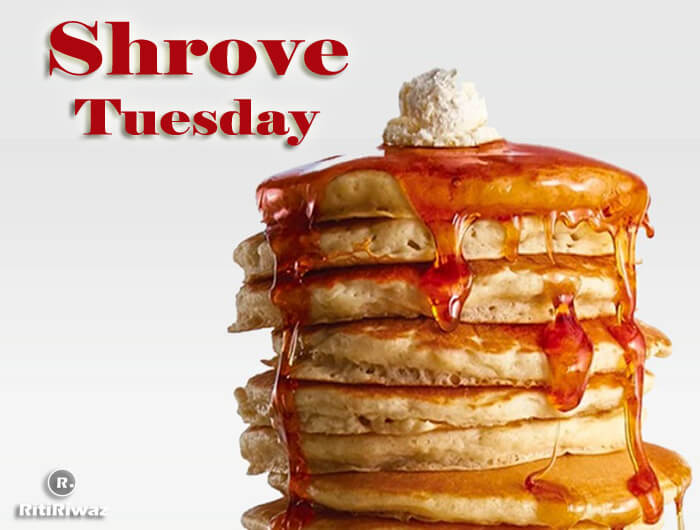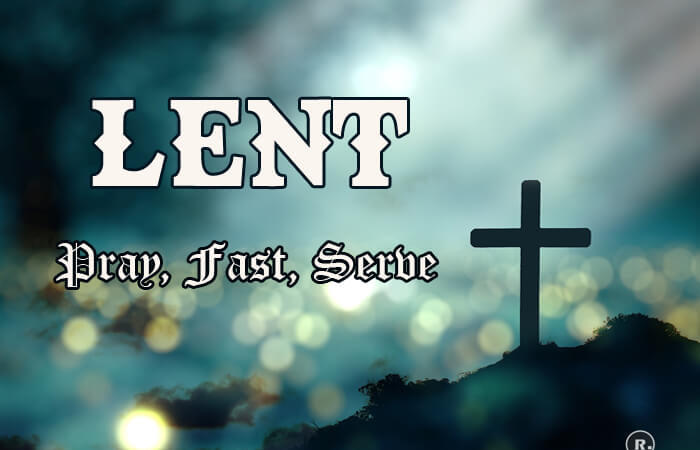Shrove Tuesday

Shrove Tuesday, also commonly referred to as Pancake Day, Mardi Gras, or Fat Tuesday is a celebration that’s observed the day before Ash Wednesday. Ash Wednesday marks the start of the 40-day Lent period, a Christian festival that leads up to Easter.
Christians across the world have, for centuries, observed Lent– the seven-week period in which luxuries and sweet things are given up as a form of abstinence leading up to Easter.
Lent is a time of abstinence, of giving things up. So Shrove Tuesday is the last chance to indulge yourself and to use up the foods that aren’t allowed in Lent. Pancakes are eaten on this day because they contain fat, butter, and eggs which were forbidden during Lent.
The name Shrove comes from the old word “shrive” which means to confess. On Shrove Tuesday, in the Middle Ages, people used to confess their sins so that they were forgiven before the season of Lent began. This became known as Shriven Tuesday and then Shrove Tuesday. This evening would be an opportunity for families to eat certain foods that would be banned during Lent, such as Meat, Eggs, Flour, Milk, and fatty foods. Everything prohibited during Lent had to go, so huge feasts of meat, eggs, butter, and other fats were prepared in the form of pancakes, which is how the day got its most popular title, Pancake Day.
This also explains why Easter Sunday, the end of the Lenten period and a time when Christians celebrate Jesus rising from the dead, is generally also marked with feasts of chocolate eggs– any Catholic who has given up sweets for Lent will tell you nothing tastes better than chocolate for breakfast on the morning of Easter Sunday.
Shrove Tuesday occurs precisely 47 days before Easter and is a moveable feast determined by the lunar calendar. This means that Shrove Tuesday is a moveable holiday that can take place in either February or March.
In 2024 Shrove Tuesday will be celebrated on the 13th of February.
Shrove Tuesday prepares us for Lent
While expressions of Shrove Tuesday vary from culture to culture, many Christians continue to observe it with confession and absolution, in addition to feasting and celebration. It is a reminder that God’s people are entering the Lenten season of fasting and self-denial. Shrove Tuesday prepares believers for Lent by allowing time for reflection and spiritual renewal before entering the solemn Lenten season.
We have historic references as old as the 11th century AD that Christians would use up their rich, fatty foods like butter and eggs the day before Lent in order to prepare their homes for their season of fasting (this is also where we get the term “Fat Tuesday,” or Mardi Gras — it’s the same day). Families use up any eggs and fats they had before embarking on their lent fast.
Other names for Shrove Tuesday
- United Kingdom, Ireland, and Australia – Shrove Tuesday, Pancake Day, or Pancake Tuesday
- Brazil – Terça-feira gorda – Fat Tuesday – the final day of Brazilian Carnival.
- Greece – Apocreas, which means “from the meat” since they don’t eat meat during Lent, either.
- Sweden – Fettisdagen (Fat Tuesday).
- USA In Catholic and French-speaking parts of the United States this day is called Mardi Gras.
- Germany – “Fastnacht” (Also spelled “Fasnacht”, “Fasenacht”, “Fasteloven” (in the Rhine area), or “Fasching” in Bavaria.)
- In France, they call it Mardi Gras, which means Grease or Fat Tuesday.
- In Iceland, the day is known as “Sprengidagur” (Bursting day).
Many countries around the world have Mardi Gras celebrations and carnivals. Some of the most famous is in Rio de Janeiro in Brazil, New Orleans in the U.S.A., Venice in Italy, and Sydney in Australia.
Suggested Read: Easter Sunday






